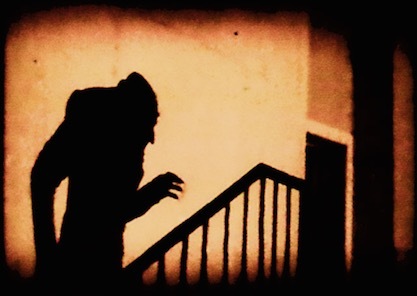On The Psychology of the Horror Genre
01/06/15 01:02 Filed in: Horror | Psychology
Originally written as extra research for a university project, I've decided to share it here as a blog post.
In this post, I discuss the psychology of the genre; what makes us tick and how the successful horror movie, book or game plays on our minds.
In this post, I discuss the psychology of the genre; what makes us tick and how the successful horror movie, book or game plays on our minds.
Introduction

The Brain
A good starting point when looking at this topic would be to examine the core of the human being, the central part of what makes us tick, the brain. When we watch a horror movie we are not mentally affected in quite the way we might think. When we see something that we are scared of like a spider our Amygdala is triggered, which is the area of the brain that deals with fear learning. But when we watch a horror film it is, in fact, some of the other parts of the brain that are being fired, so we are not technically being scared.
Oxford Dictionary defines Horror as "an intense feeling of fear, shock, or disgust".
The areas of the brain that are triggered when we watch a horror movie
are as follows;
I. Visual Cortex (processes imagery)
II. Insular (self-awareness)
III. Dorsal Medial Prefrontal Cortex (attention, planning and problem solving)
IV. Thalamus (a relay switch that connect the other parts)
(FilmmakerIQ.com, 2013)
The Attraction
So what is the great attraction that many of us have with the horror genre? The psychoanalyst Sigmund Freud pointed out in his 1919 essay ‘The Uncanny’ that people tend to like things that are horrific, such as scary stories because they are foreign, yet familiar. Therefore, people are attracted yet, at the same time repulsed by what they are seeing/reading.
Another theory comes from the psychiatrist Carl Jung who theorised that we all have what he called archetypes that come from our collective unconsciousness (Cherry, K. 2013). The collective unconsciousness he said is the part of the mind that he believed held in it the inherited knowledge of the human species. These archetypes are templates for how we are to deal with different things and are unlearnt. The main archetypes of the many are the shadow and is how we handle our bad behaviours and repressed desires and could perhaps be thought of as our Mr. Hyde.
If we are to look for an another archetype and one which has worked very well in the horror genre, we can find the Mother. It is this archetype that worked so well in the Psycho (Hitchcock, 1960) movie. This movie and its remake play upon our instinct that the mother figure is protective and nurturing and turns it around, so she is the killer lurking in the shadows.
While looking at these various theories we can actually go back to at least ancient Greece and the philosopher Aristotle. He came up with the idea of Catharsis, a metaphor he used to describe the effect on a viewer of a tragic play. He said that by watching such a play we purged our minds of fear, aggression and other such negative emotions. The old tragic plays of ancient Greece maybe far flung from modern horror movies and video games, but a parallel can still be made between the two.
Habituation
A more recent psychologist Marvin Zuckerman explains "Well, there's a thing that happens with sensation-seeking. Habituation. Habituation is a basic law of learning, the lowest organisms. When you expose them to something repeatedly, over and over, they respond less to it, they are less aroused by it, even though initially it was arousing, when they get used to it then nothing particular happens, they get less aroused. Now in the violence around sex this occurs too. Habituation. So, what was initially very arousing, let's say in sex, you know the honeymoon, with time becomes still pleasurable, but less arousing and that's why the high sensation seekers have to look for new sources of arousal. Now this occurs in films too. You start out with simple horror films and the high sensation seekers say, "Eh, that's fine." But they get bored by it and so when they are allowed to legally and recently society has loosened the laws about the depiction of violence and sex in the media. So, they keep pushing it to the extreme because that as high sensation seekers become habituated, they become bored with it and they need something more. They go to something that's more exciting".
A Safe Thrill
In connection to Habituation, we have the belief that many people watch horror movies or play horror games, as a way of escaping their boring normal lives and having a dangerous adventure, or facing the unknown while at the same time being completely safe.
Three Prime Factors
There are three prime factors to the allure of this genre. Firstly we have tension, which includes; suspense, shock, and mystery. Secondly there is relevance, the most successful horror films in recent history have used relevance such as cultural relevance. An example of this would be the Americans fear of communism in the 1950s/60s leading to the birth of (Poupard, 2007) Night of the Living Dead (Romero, George A., 1968). Lastly and perhaps a little oddly we have unrealism, as the successful horror keeps an air of unrealism. There was a study (Rozin P., Haidt J., & McCauley C. R., 1993) carried out on a group of students who were shown a gory documentary and most were unable to finish watching it, however, the same students often watched worse things in horror films.
The Punishment of the Wrongdoers
A popular aspect to the storyline of films in this genre is the notion that those being killed are in some way “wrongdoers”. The victims were doing something recently that is or at some point in history has been considered unacceptable. Such as having premarital sex or taking drugs.
Pacing
One aspect that the good horror movie or video game uses to play on our psychology is Pacing. Pacing elements out correctly can make the difference between getting a successful scare or not. So for instance if the timing of events are not right such as a killer or ghost jumps out too often, the effect will be less potent.
Anticipation
Anticipation is somewhat tied into pacing. Anticipation is a way to build up the viewer or player’s tension until the big climax, where it can begin all over again. If the build up is for nothing the viewer/player may quickly become bored, although if this is done sparingly then it could also lull the player/viewer into a false sense of security and, in fact, scare them even more, the next time around when it does happen. Therefore pacing is key to anticipation.
The Snuggle Theory
There is a theory that people watch horror movies to be close to other people. The findings of Ph.D. student Mike Battista seems to agree with this, finding that both males and females tend to exaggerate their emotions while watching a horror movie, although in different ways. Males often act braver so women will grab hold of them, whilst females act more scared. Thus bringing them together and is why horror movies are now considered a great choice for a first date.
Conclusion
As we have just learnt the horror genre especially in films has always been and continues to be, very popular and profitable. The successful horror taps into our psychology with things that are foreign yet familiar and relevant and uses correct timing to build up our anticipation until the climatic scare. It pulls on our sense of right and wrong, brings us together, gives us a safe thrill and understands what makes us tick. Once we have a good grasp of the psychology behind fear and horror, we can then take these things and apply them to both movies and games to create a better experience.
blog comments powered by Disqus

